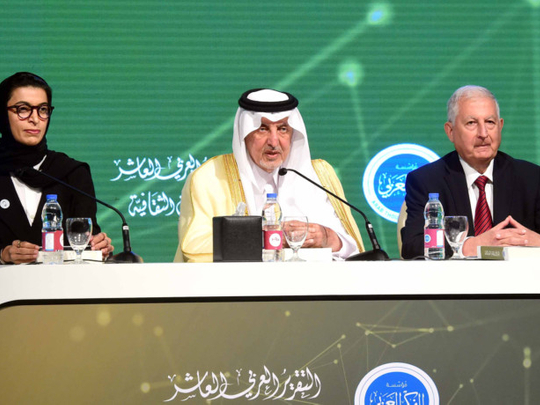
Dubai: Arab countries are in urgent need of major development in the field of scientific research and technological innovations, according to the 10th Arab Annual Report on Cultural Development.
The report was released on Monday on the first day of the FIKR16 conference taking place in Dubai.
Titled ‘Innovation for Extinction? Scientific Research in the Arab world, Reality, Challenges and Perspectives,’ the five-chapter report examines the performance of 22 Arab countries in different aspect of scientific research, technology and innovation, while providing suggestions and recommendation to bring about sustainable development in the region.
Published by the Arab Thought Foundation, the report was launched by Prince Khalid Al Faisal, Adviser to Saudi king, Governor of Makkah Region and the chairman of the Arab Thought Foundation.
“Arab countries have two options; one is to fall into poverty, unemployment, immigration, and social and political unrest, or they can work on new strategies to develop scientific research and technological innovation, to support a comprehensive sustainable development plan,” he said.
Referring to the report, Al Faisal pointed out it is no longer possible for Arab countries to spend more on education than developed countries, considering their economic growth remains lower.
“Arab countries need to work towards creating a knowledge-based society, which disseminates information and helps nations prosper, bettering the well-being of its people,” said Al Faisal.
In the field of higher education, the report highlights major issues that have impacted Arab countries over the past two decades. These issues include mismatching outcomes of higher education to societal needs, and failing to adapt digital technologies to higher education. Low enrolment rates in higher education, specifically in the fields of applied sciences and mathematics in comparison to rates in the fields of arts, social sciences, business and law, has also negatively impacted scientific research.
The report shows that the Arab region suffers from a shortage of holders PhD degree holders who are considered the mainstay of higher education in scientific research systems.
“The UAE has become an example for other young countries in the region, setting new benchmarks for prosperity, advancement, and knowledge,” added Al Faisal.
Speaking on the occasion, Noora Al Kaabi, UAE Minister of Culture and Knowledge Development, said the knowledge and innovation has become a strategic source of development for the economy, describing it as “wealth that continues to grow to transform a country to a knowledge economy.”
“The report matches research with practical recommendations, while addressing challenges facing the Arab world. It highlights the huge gap between the Arab world and the international community when it comes to scientific research and new and unique technologies,” she said.
The report stresses that greater efforts are needed in the allocation of resources, financing and monitoring when it comes to scientific research.
It also discusses challenges stemming from limited practices that tend to rely on importing scientific and technological outputs rather than building local capacities.
Al Kaabi referred to the UAE’s National Innovation Strategy 2030, which aims to make the UAE one of the leading countries when it comes to innovation, while promoting economic growth, as an ideal example of progress.
The report having 25 research papers has been divided into five chapters: Scientific research and higher education, Leveraging innovation and development, Cultural and scientific trends, Innovation and technological development, and the Mechanism to build a knowledge based economy.
Authors of the report include a number of Arab researchers representing every Arab nation including the GCC, the Levant countries, the Nile Valley, and the Maghreb. The report is also considered a response to the UN agenda of sustainable development 2030.
Considered the main reference in upcoming discussion taking place during the four-day FIKR16 conference, the report is available in Arabic.
Held under the theme ‘stabilisation challenges amid regional turmoil,’ the conference will provide an opportunity for participants to engage in an in-depth exchange of ideas and experiences to address the challenges currently facing the Arab world.
Attendees will discuss relevant policies and potential solutions to be incorporated into a future action plan aimed at stabilising Arab nations and societies.








